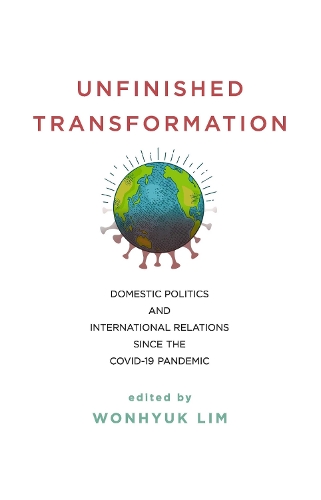
Unfinished Transformation: Domestic Politics and International Relations since the COVID-19 Pandemic
(Hardback)
Available Formats
Publishing Details
Unfinished Transformation: Domestic Politics and International Relations since the COVID-19 Pandemic
By (Author) Wonhyuk Lim
Bloomsbury Publishing PLC
Brookings Institution
6th May 2025
United States
Classifications
Professional and Scholarly
Non Fiction
327.73051
Physical Properties
Hardback
240
Width 152mm, Height 229mm
Description
The end of the Cold War, the acceleration of globalization, and the rise of the rest posed serious challenges to the existing international order based on World War II settlements and Cold War modifications.The Global Financial Crisis of 2008 provided an opportunity to address this problem, as evidenced by the emergence of the G20 at the leadership level, but this adjustment, reflecting a sea change in international economic and political realities, was by no means a smooth process. Domestically, in many advanced industrial countries, there was a populist/nativist backlash as increasing socioeconomic disparities and interaction with the outside world produced economic anxiety and status anxiety.Politicians who promised to take back control appealed to a large number of voters, using us vs. them rhetoric to divert attention from socioeconomic inequality. Thus, even before the outbreak of COVID-19, the combination of international power shift and populist/nativist backlash made global cooperation a precarious proposition, even though the proliferation of global value chains, climate change, and infectious diseases made global cooperation more imperative than ever before.
The pandemic has accelerated the pre-existing trends of increasing inequality at home and decreasing inequality among countries, especially U.S.-China competition. It is evident that these accelerating trends cannot lead to stable outcomes, as they exacerbate the risks of crisis and conflict if they continue. This book explores how domestic and international transformation can address these problems. Domestically, instead of blaming the global elite and outsiders, investing in people should receive priority, given the challenges of automation and globalization. Unless workers and the middle class feel secure enough, governments would find it difficult to push for international initiatives. Internationally, a new order should reflect changing economic and political realities, with guardrails to prevent conflict and mechanisms to promote global cooperation.
Author Bio
Wonhyuk Lim is a professor at the KDI School of Public Policy and Management. He specializes in international political economy and industrial organization. His previous books include Economic Crisis and Corporate Restructuring in Korea, Global Leadership in Transition, and The Korean Economy: From a Miraculous Past to a Sustainable Future.
